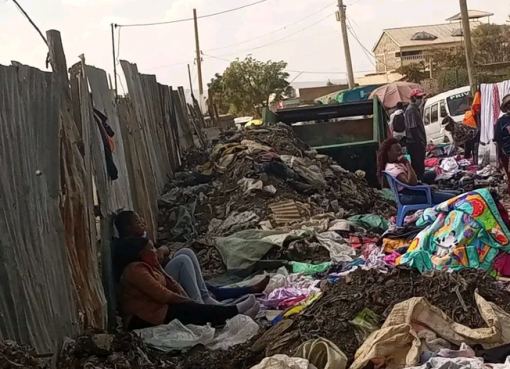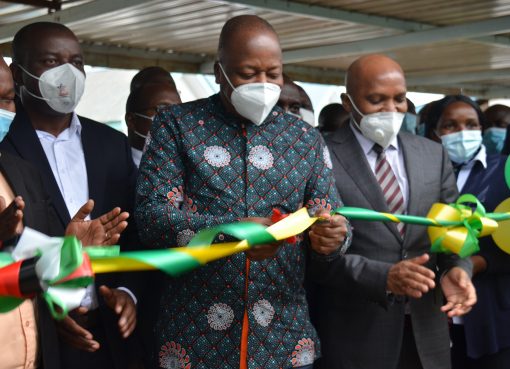The Ministry of Health in partnership with UNICEF and Core Group Polio Project have rolled out a polio vaccine that targets 11 counties which will see about 2,635,714 children below five years get vaccinated.
The Polio vaccine national launch will be held in Isiolo county on 29th November 2019 and the mapped counties of Turkana, Marsabit, Mandera, Wajir, Garissa, Tana River, Isiolo, Kilifi, Mombasa and Nairobi with most of the counties bordering neighboring countries such as South Sudan, Somalia and Ethiopia.
Ministry of Health Diseases Surveillance and Epidemics Response Head of Department, Dr. David Langat, said that although Kenya has been polio free since 2005, the country has experienced several outbreaks due to importations through the porous borders.
“Kenya through the Ministry of Health and our core partners in polio eradication that will kick off from 29th November 2019 to 4th December 2019 will also liaise with the neighboring countries to carry out a simultaneous vaccination,” said Langat.
Langat said that Kenya was certified polio free in 2005 and no indigenous case reported in the country since 1984 and only Wild Polio Virus (WPV) still recorded in two countries Afghanistan and Pakistan.
“Ongoing outbreak in the Horn of Africa (HOA) increases the risk of importation into the country,” explained Langat.
Langat further noted that high population movement of immigrants and refugees across the countries with unknown history of vaccination status have been addressed too.
“Campaigns will increase the population immunity to interrupt transmission,” added Langat.
Langat said that, identification, mapping and tracking of special populations have been singled out.
“We have made accurate communication and timely information to the health care community, decision makers, and the public to effect behavior change and engage civil society, political commitment to obtain resources and support,” added Langat.
Langat also said that, trainings focused on special populations that include nomads, pastoralists, refugees, gated communities, asylum seekers, street families and informal settlements have to be conducted.
Speaking at a Nairobi hotel on Wednesday during an Immunization sensitization on Polio, Langat said that High Routine Immunization covers 95 per cent to stop transmission of poliovirus.
Langat also said that children should receive at least three doses of Bivalent Oral Polio Vaccine (bOPV) and at least one dose of IPV against the polio virus.
Public Health Specialist, David Githinga, said that, “We have a wide reach in trying to educate families about polio within Kenya, South Sudan and Ethiopia.”
Githinga noted that the Supplementary Immunization Activities (SIAs) are expensive exercises done to persons who are unable to get routine immunization.
He also explained that there are areas where people lock their gates and insist that there are no under five year’s old children, this become hard to get to such areas.
“I fear there is a lot of rain right now and people who have polio in their system will be pushing it in the water system and we will get transmission through drinking water,” added Githinga.
Githinga affirmed that it is not an issue of too much vaccines but important for the children to get the vaccinated.
He further noted that Polio is an oral vaccine which has very low side effects which include getting a little serum sickness, low fever less than 38 celcius which is less important compared to what you could suffer.
Core Group Polio Project Director, Ahmed Arale, said that, “We work in border areas to ensure that anyone coming in and going out is well covered too.”
Arale said that in collaboration with WHO, UNICEF and the Ministry of Health and community volunteers, they link the communities to health facilities through outreaches.
“We provide special teams who man transit points since nomads pass anywhere and we track them to ensure that we are safe against polio as a country,” Arale added.
Unicef Kenya Communication for Development, Jayne Kariuki Njuguna said that Kenya is on the right path in eliminating polio by reaching every child no matter where he or she is and give voices to those who are often not heard.
“We normally do a synchronized campaign in Kenya, Somalia and Ethiopia so that movement is controlled,” added Kariuki.
Polio Champion, Joseph Ndegwa Wangui, said that, “I suffered polio while I was four years so I urge parents to accept and immunize their children.”
Ndegwa added that, Polio effects are so dangerous since it can make a child completely paralyzed and braved that as a champion he will strive to always ensure there will be door to door campaigns.
By David Musungu





